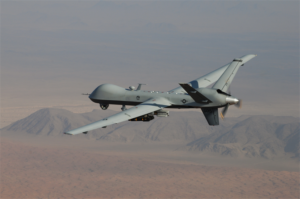The U.S. has loosened restrictions on the export of military drones to foreign nations, updating rules to allow allies to purchase larger unmanned systems that can fly up to 800 kilometers per hour.
The new policy, announced Friday, effectively removes the “presumption of denial” consideration under Missile Technology Control Regime (MCTR) regulations that previously blocked most foreign military sales for platforms such as MQ-9 Reaper and RQ-4 Global Hawk drones.

“This policy change, in effect, modernizes our approach to implementing MTCR commitments. It makes it more reflective of the technological realities. It helps our allies. It helps our partners. It helps them all meet their urgent national security and commercial requirements. And it also advances the United States’ national security and economic interests,” R. Clarke Cooper, Assistant Secretary of State for Political-Military Affairs, told reporters.
Previously, the U.S.’ interpretation of MCTR guidelines, which sets rules for 35 member nations, prohibited most sales of Category 1 UAS capable of carrying payloads up to 500 kilograms for more than 300 kilometers.
“In a sector of rapidly evolving technology, the MTCR’s standards are more than three decades old. Not only do these outdated standards give an unfair advantage to countries outside of the MTCR and hurt United States industry, they also hinder our deterrence capability abroad by handicapping our partners and allies with subpar technology,” the White House said in a statement. “More than two years of discussion with MTCR partners were unable to produce consensus on this overdue reform. Therefore, the President has decided to invoke our national discretion to treat a carefully selected subset of MTCR Category I UAS, which cannot travel faster than 800 kilometers per hour, as Category II.”
Cooper said FMS cases for such drones would still undergo the rigorous review criteria, noting the MCTR guidelines have been in place to prevent the proliferation of high-level weapon systems abroad.
“The United States is going to continue conducting our robust review procedures for exporting UAS technology to support global non-proliferation objectives. And we encourage members of the MTCR, as well as non-members such as China, to do the same,” Cooper told reporters. “The subset of UAS affected by this change poses no risk for weapons of mass destruction delivery. Higher speed systems, such as cruise missiles, hypersonic aerial vehicles and advanced unmanned combat aerial vehicles, are not affected by this revision.”
The new update follows an April 2018 policy change allowing for direct commercial sales of drones with allies and eliminating a laser designation for UAS technologies that had reduced a number of sales (Defense Daily, April 20 2018).